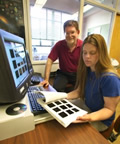| |
|
Today
8:30 – 11 a.m.
EHS 275
Confined Space Hazards
Building 51-201
11 – noon
EHS 274
Confined Space-Retraining
Building 51-201
1 – 2:30 p.m.
EHS 330
Lead Hazards Awareness
Building 51-201
2:30 – 3:30 p.m.
EHS 277
Confined Space Permit Writer
Building 51-201
Monday
No events scheduled.
|
|
| |
| |
Market Carvery: Stroganoff with Butter
Noodles
Fresh Grille: Fish and Chips
Menutainment:
Viva La Burrito! Chicken or Pork
|
| B'fast: |
6:30 a.m. - 9:30 a.m. |
| Lunch: |
11 a.m. - 1:30 p.m. |
| Full
Menu |
|
|
|
 |
 |
|
| Seeking
Biology's
Most Beautiful
Confident
in the inherent beauty of the way biologists practice
their craft, the American Institute of Biological Sciences
(AIBS) is asking its members, and anyone else with an
interest, to identify biology's most beautiful experiments.
Inspired by a
similar campaign held by Physics World to find
the most beautiful physics experiments, the AIBS is asking
biologists to submit candidates for experimental biology's
beauties through the end of 2003. Those offering submissions
must make their case in no more than 500 words. A panel
of four judges, composed of scientists as well as historians
and philosophers of science, will judge the entries, and
the AIBS journal BioScience will feature the top
picks in a series of essays commissioned from experts.
For more information go here.
|
|
|
 |
Summer
Programs
Train Future Scientists
|
|
 |
 |
|
|
| Physicist
George Smoot mentors student Rebecca Nicodemus,
Purdue University. |
|
|
|
Wonder
why those faces in the cafeteria seem to get younger whenever
summer rolls around? Look no further than the Center for
Science and Engineering Education (CSEE), which brings
talented young people to the Lab each summer via high
school and undergraduate student programs. CSEE offers
several programs to qualified college students, including
paid research internships, summer study for community
college students, faculty and student team programs, and
pre-service training for undergraduates who are interested
in becoming science, math, and technology teachers. CSEE
also provides talented high school students from the Bay
Area with summer science experiences. All these programs
are made possible with the help of dedicated mentors.
For more information on CSEE college programs, go here.
For information on how to become a mentor, go here.
|
| |
|
|
 |
|
TEID
Digital Camera
Expands Capabilities Need
a high-resolution, poster-sized photograph, or detailed photos
taken in dim light? The Technical & Electronic Information
Department (TEID) may have the answer. Their new Canon EOS-1
camera can shoot 11 megapixel photos, with a maximum file
size of 31.5 megabytes. In addition, an insertable compact
flash card allows TEID photographers to take and store dozens
of pictures on any one shoot. The camera outperforms less-expensive
digital cameras on the market, which typically can shoot only
4 megapixel photos, and offers vastly improved software to
create superior, highly detailed pictures. To learn more about
the camera go here.
To order photo services go to [email protected]. |
|
|
|
|
| Blocking
Windows Vulnerability May Affect Some Applications
There
is a new vulnerability in the Windows Remote Procedure Call
service (port 135). Accordingly, all incoming LBLnet traffic
to TCP port 135 is being blocked to protect Berkeley Lab Windows
systems. Although there will be no effect on most Windows
users, this may disrupt a few Windows systems and possibly
SAMBA clients' access to applications on Lab servers if the
systems are outside of LBLnet, NERSC, ESnet and JGI. If your
system is experiencing such disruption since the new block
was put in place July 18, please contact the Help Desk at
[email protected] or 486-4357.
For more information on patching the Windows vulnerability,
go here. |
| |
|
 |
|
 |
| |
|

